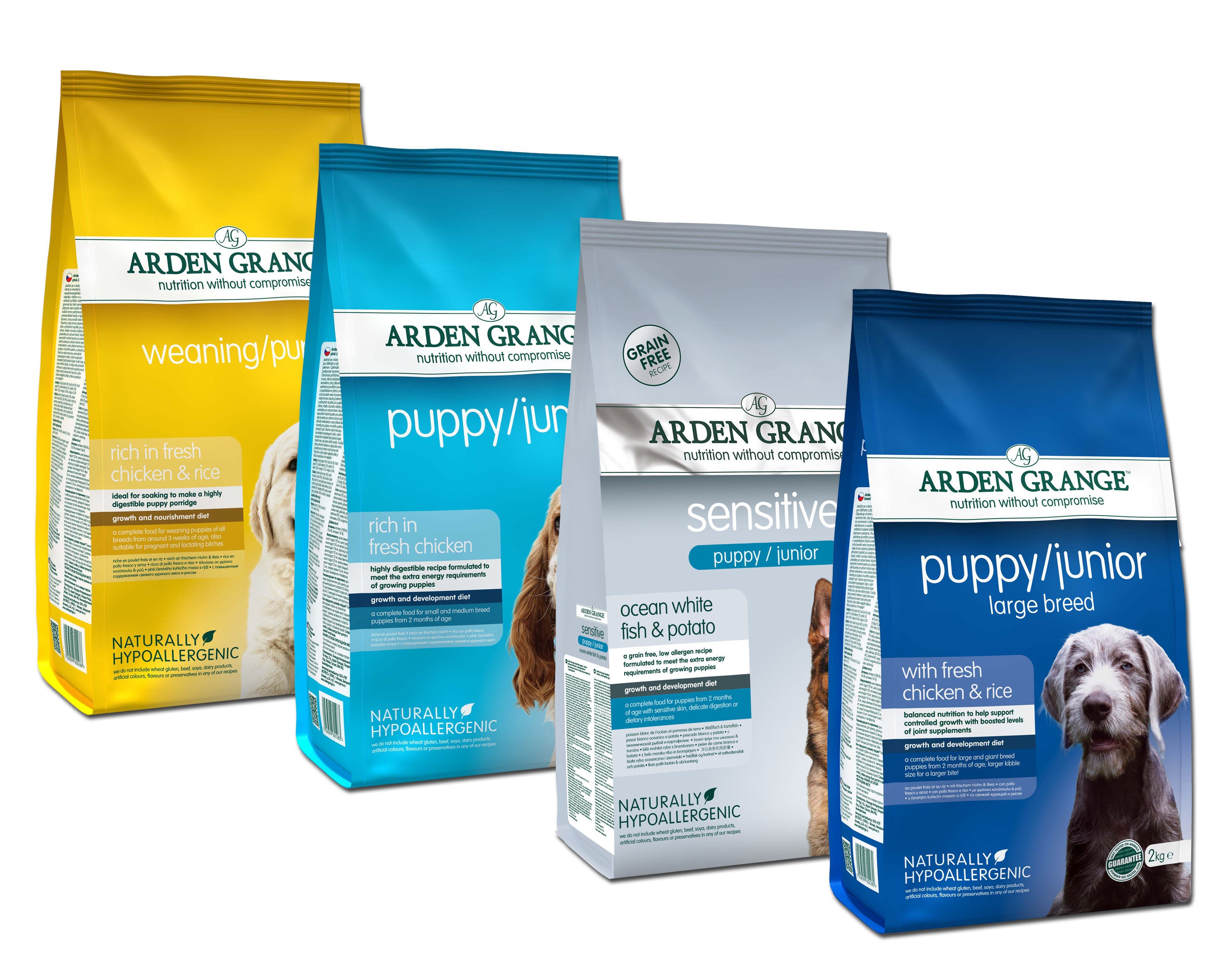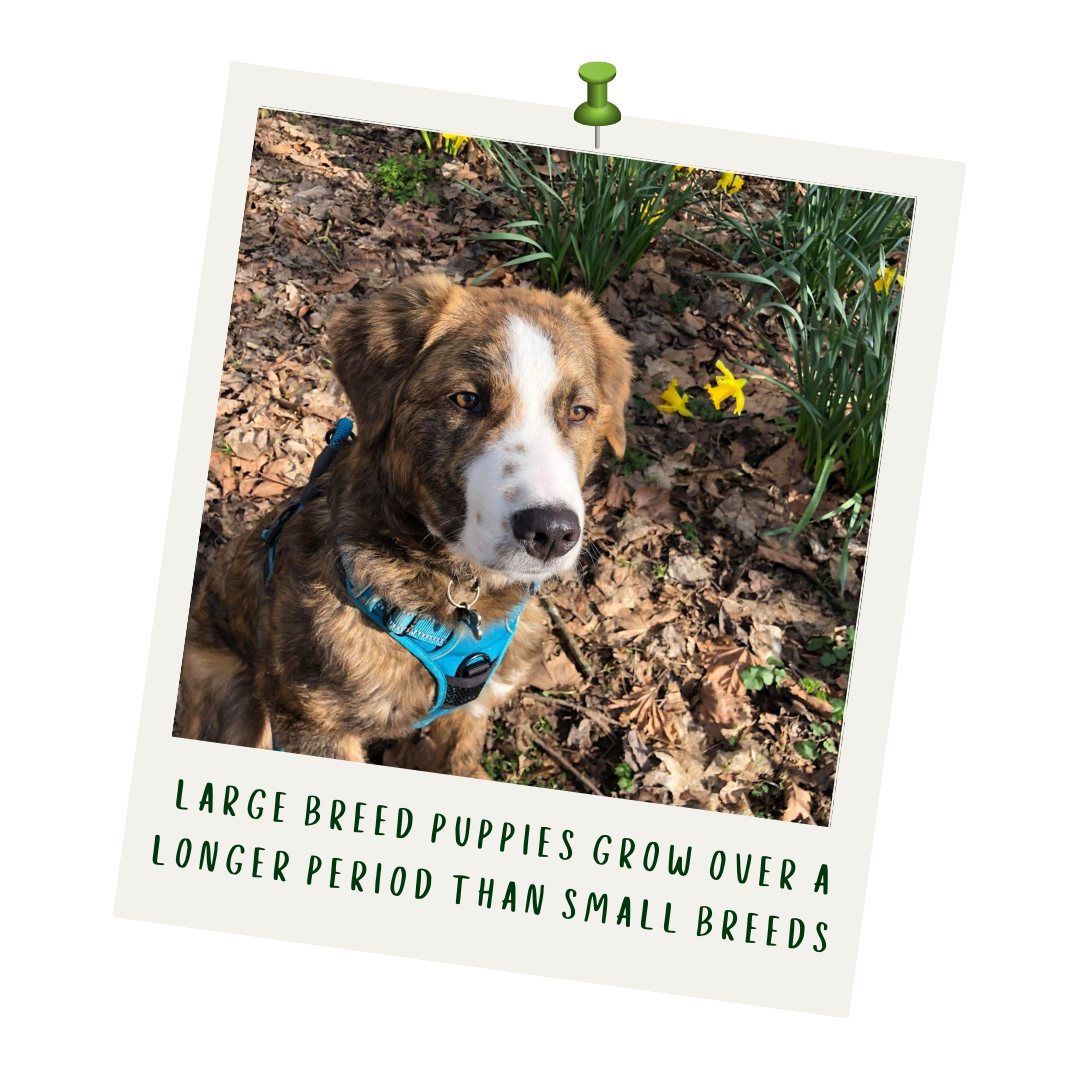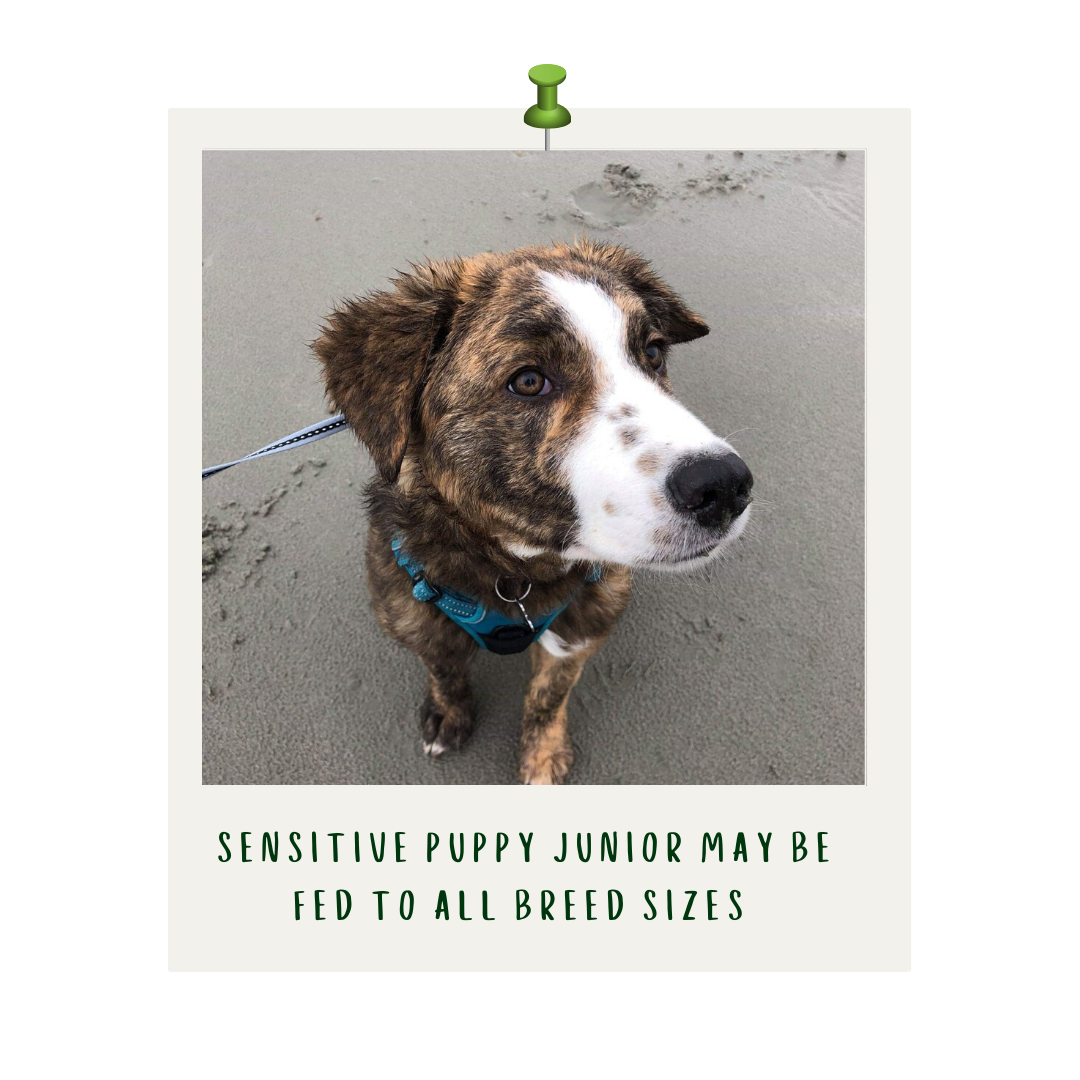Puppy nutrition

By Ness Bird - Nutrition Adviser and RVN CertCFVHNut ©
Puppies
require a diet which provides optimal levels of nutrients that are required for
growth, and sufficient calories to maintain their energy requirements. Puppies
have greater structural and functional demands upon their bodies, a faster
metabolic rate, and a subsequently higher need for calories than an adult dog
of the same weight.
Feeding a super-premium quality complete food such as Arden Grange reduces the risk of over or under-nutrition. Every recipe contains not only the essential nutrients for controlled and healthy growth, but many safe and natural healthcare supplements that may optimise your puppy’s overall general health and well-being.
During early growth, the digestive system is at its most sensitive. It is important to choose a very highly digestible food that will ensure balanced intestinal flora, and a regular intestinal transit resulting in firm stools.
Puppy Junior Large Breed is lower in protein and fat (and calories) to help reduce the risk of developmental bone disease associated with over-nutrition in large and giant breeds, and to help promote a slower and steady rate of growth over a longer period of time.
Feeding a super-premium quality complete food such as Arden Grange reduces the risk of over or under-nutrition. Every recipe contains not only the essential nutrients for controlled and healthy growth, but many safe and natural healthcare supplements that may optimise your puppy’s overall general health and well-being.
During early growth, the digestive system is at its most sensitive. It is important to choose a very highly digestible food that will ensure balanced intestinal flora, and a regular intestinal transit resulting in firm stools.
Puppy Junior Large Breed is lower in protein and fat (and calories) to help reduce the risk of developmental bone disease associated with over-nutrition in large and giant breeds, and to help promote a slower and steady rate of growth over a longer period of time.

Chicken or
white fish, egg and krill are included in all of the Arden Grange dry puppy
foods alongside prebiotics (for digestive support), nucleotides (for digestive
and immune support) and natural antioxidants (for protection against free
radical damage). Skeletal health is promoted by the addition of glucosamine,
chondroitin and MSM.
Switching to an adult food
It is
recommended switching to an adult food once puppies reach their optimal height.
There is considerable variation between breeds, with large breeds maturing much
slower than smaller breeds (and growing over a longer period of time). There is
also a difference in developmental rates between every dog as an individual
which will be dependent upon genetic build, metabolism and digestion. If in
doubt it is sensible to
contact the breeder of your puppy, your vet or our
nutrition advisers.
Benefits of Growth Diets
Some sources suggest puppy food is simply a marketing ploy. Whilst some brands do manufacture food suitable for all life stages, the nutrient values (particularly amino acids, vitamins and minerals that are so important for healthy development) have been tailored specifically for developmental requirements in a growth diet, rather than to encompass a much broader market.
Specific growth diets also make consumer choice easier – some adult foods may well be suitable to feed to kittens and puppies, but not all of them are; and choosing a growth specific food can help avoid making potentially detrimental mistakes.

Hints & Tips
- It is sensible for a new owner to continue to feed the product the breeder has been using for a reasonable period before changing to an Arden Grange growth diet because leaving the dam and litter mates can be stressful, and a diet change at this sensitive time could result in an upset digestion. The new environment will be full of novel noises, smells, people and possibly other animals to get used to, and a familiar diet means one less new thing to immediately acclimatise to.
- Weigh your puppy regularly to ensure food intake is appropriate. Take care not to over-feed, as over-nutrition can not only result in an overweight puppy, but also predispose the individual to loose stools and developmental problems. Panosteitis (growing pains) is believed to be multifactorial with genetic links, but in a nutritional context, over-feeding and providing an unbalanced calcium to phosphorous ratio may be to blame.
- Measure your puppy’s height with a tape measure at the withers to check if there is still some upward growth to complete once they are older. Measure again in 2 weeks and you will be able to tell whether any further growth has occurred.
- Gradually make any changes to the feed volume, be it an increase or decrease. Our puppy feeding guides show some reductions to the feed volumes for the later age ranges. This is because when puppies become older, their metabolic energy requirements start to decrease. When this happens, the demand for those extra calories needed for growth starts to decrease too. It would be easier if puppy energy requirements increased in a nice neat linear fashion in line with their age and weight, but in reality it is quite a wonky “stair case” if you look at their needs visually on a graph. Generally, as the pup grows, he or she will get heavier, which does tend to balance the figures out a little, but there will be times when you do need to decrease the intake a little. A gradual reduction will allow the stomach time to contract slowly, thus minimising the risk of a very hungry puppy. However, there is often a natural decline to appetite when a pup's requirements are reducing as he or she gets older.
- To soak or not to soak? We recommend that the majority of the kibble is soaked with a little warm water for 20-30 minutes for younger puppies. This softens the food and makes the initial work of the digestive enzymes easier. It also brings out the aromas of the food, and a soft texture is usually more appealing when a puppy is teething.
- Poo watching is one of the best ways to check the feed volume is suitable. If the stools are normal in the morning but get progressively looser throughout the day, it may be a sign that he your pup is getting a little too much food. It can however be indicative of other problems too, so do watch carefully and seek veterinary advice if a small food reduction doesn’t improve the situation.
- For large and giant breeds, we recommend soaking the food throughout adulthood, particularly if the dog is a fast eater. This helps to deter the natural heavy thirst that occurs after a dry meal. A lot of water on top of a full stomach may increase the risk of bloat.
- Do take care not to soak the food for long periods of time otherwise it may be subject to bacterial growth or attract flies, especially if it is left somewhere warm or the weather is hot.
- Frequency of feeding – we’d initially suggest following the breeder’s advice as puppies develop at different rates. As a guide, puppies up to 12 weeks will thrive on 4 meals per day. From 12 weeks to 6 months we’d suggest 3 meals per day. We recommend 2 meals per day for adults, although dogs with digestive problems may benefit from more frequent mealtimes.
- We don't recommend supplementing the Arden Grange growth diets (unless advised by your vet to correct a nutritional deficiency) because the products are complete and balanced.




 Proudly British
Proudly British